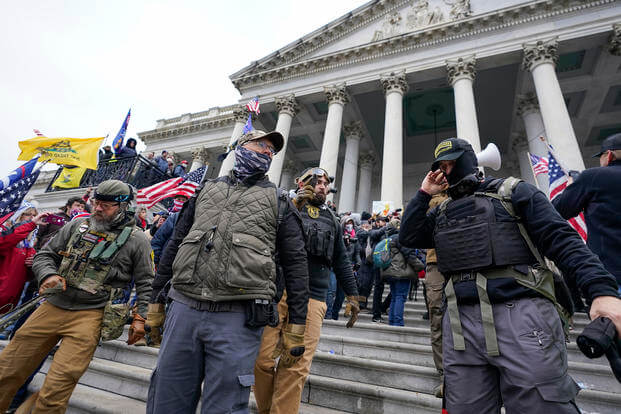A first wave of firings has begun in the Department of Defense as President Donald Trump and billionaire Elon Musk continue to terminate federal employees and slash agencies.
Military.com has learned that civilian workers in at least four organizations -- the Defense Health Agency, Defense Logistics Agency, the Navy[1] and the Uniformed Services University of the Health Sciences -- have already been told they are fired.
But officials in the office of Defense Secretary Pete Hegseth, when contacted by Military.com about how many people were fired and at what agencies, didn't have any answers. A spokesperson for the secretary's office instead referred questions "to each agency to speak about their workforce."
Read Next: 83,000 VA Employees Slated to Be Fired This Year by Musk's DOGE, Memo Says[2]
A Defense Health Agency employee whose work supports the global health of America's fighting forces received a pink slip Monday, less than a month before her employment status with the federal government was slated to become permanent.
The firing, along with an unknown number of others at the Defense Department, occurred this week despite a federal judge's ruling Feb. 28 that the dismissals, originally ordered by the White House's Office of Personnel Management, were likely unlawful.
The Pentagon announced Feb. 21 that it planned to fire 5,400 probationary civilian workers in an initial effort to reduce its federal workforce by 5% to 8%, which could ultimately mean tens of thousands of workers will lose their jobs. The purge was to begin the following week but did not appear to get underway until Monday.
The Defense Department has not said how many people have been let go so far, but at least 100 from the Defense Logistics Agency and dozens at the Defense Health Agency have lost their jobs.
A DoD spokesman referred questions about firings to individual agencies within the department. The Defense Health Agency referred questions back to the DoD, while the Defense Logistics Agency said it fired some of its probationary workers.
The public and Congress have been largely kept in the dark as thousands of workers across the federal government have been terminated amid Musk's so-called Department of Government Efficiency -- a team of his personal assistants -- review, which entails plugging into federal systems and eliminating people and programs deemed inefficient.
A defense official who was granted anonymity to speak more candidly told Military.com that the DLA's layoffs consisted of less than 100 people out of a 25,000-person workforce and just a small fraction of the overall planned total of 5,400 probationary employees announced by Pentagon leadership.
Officials with the Navy, meanwhile, told Military.com that data on its firings isn't readily available.
The federal government has not released any data on the number of employees who have been terminated or the types of jobs they held. The federal workforce has 200,000 probationary workers, and 75,000 employees accepted deferred resignation offers from the executive branch, according to The Associated Press.
The DHA employee, who requested anonymity out of hope that she may be reinstated, said she tracked the news about federal firings elsewhere, had taken steps to comply with Trump's executive order ending remote work, and hoped to make it to the end of the month when her probationary period expired.
"I love my job. I really, really believe in the mission that we have, what we do in our day-to-day," said the worker, who added that she had received two performance awards in her 11 months at the DHA.
According to the employee, she was given less than 10 minutes to attend a Microsoft Teams meeting Monday with her supervisor. When she logged on, she was among more than 30 other DoD employees told they were being let go, ostensibly for "performance issues."
Most of the correspondence and messaging in the recent firings of probationary federal workers, which began early last month, contained boilerplate language noting poor performance.
"Gosh, it was insanely impersonal. We were not allowed the opportunity to ask questions, nothing. It was basically, 'Here it is. You have questions? Ask your supervisors,' who were also in the dark, by the way," she said.
The firings have triggered lawsuits claiming they are unlawful. As the litigation winds through the courts, the Office of Personnel Management on Tuesday published a revision to its termination guidance saying it is not instructing other federal agencies to dismiss probationary employees.
"Please note that, by this memorandum, OPM is not directing agencies to take any specific performance-based actions regarding probationary employees," the revision states. "Agencies have ultimate decision-making authority over, and responsibility for, such personnel actions."
Darin Selnick, a Trump adviser who is performing the duties of secretary of defense for personnel and readiness, issued a memo Monday directing that the firings of probationary employees begin.
He said the dismissals would be of employees "whose contributions are not mission-critical."
The Trump administration argues that the cuts are needed to reduce the size of the federal government and slash the national debt, which now totals more than $36 trillion.
Pentagon spokesman Sean Parnell said Monday that the Department of Government Efficiency, or DOGE, headed by Musk recently was granted access[3] to the Pentagon and made "initial findings" that "will probably save $80 million in wasteful spending," although Parnell did not provide a listing of the programs and dismissals that would account for the full $80 million.
The turmoil already is disrupting the lives of U.S. service members and their families. A memo sent to troops[4] at Hill Air Force Base[5] in Utah said child development center workers who voluntarily took a deferred resignation from the administration or were probationary were being targeted for firings.
The dismissals are also likely to disproportionately hit military spouses[6] and veterans who receive preferential hiring status for federal jobs. Roughly 27% of military spouses who have jobs work for federal, state or local governments, and veterans make up one-third of the federal workforce.
Veterans groups are pushing back at the firings, calling them indiscriminate and asking the Trump administration to protect veteran employment[7].
"It has become clearer that the veteran community has been hit hard as probationary federal jobs are being axed across the country," VFW National Commander Al Lipphardt said. "These are employees who have been serving the American people for years, in uniform and in civil service, and at least some of whom have been or are being caught by a formality in administrative statuses."
But on Tuesday, the White House dismissed concerns about veterans being disproportionately affected by the firings.
White House adviser Alina Habba told reporters Trump cares about veterans, but she also said he has a responsibility to "use taxpayer dollars to pay people that actually work."
"We are going to care for them in the right way, but perhaps they're not fit to have a job at this moment, or not willing to come to work," Habba told reporters in a brief conversation on the White House lawn. "I wouldn't take money from you and pay somebody and say, 'Sorry, you know, they're not going to come to work.' It's just not acceptable."
Democratic lawmakers, meanwhile, have seized on the firings of veterans as part of their political messaging.
At Trump's address to a joint session of Congress on Tuesday night, several Democrats invited fired veterans as their guests. For example, one of the guests of Senate Minority Leader Chuck Schumer, D-N.Y., was Alissa Ellman, whom he described as a disabled veteran who served in Afghanistan and was fired from her job at the Buffalo, New York, VA as part of the department's 2,400 probationary worker firings.
Earlier in the day Tuesday, Senate Veterans Affairs Committee ranking member Sen. Richard Blumenthal, D-Conn., also tried to force a vote on the Senate floor on a nonbinding resolution that would have condemned firings at the VA and put the Senate on record as saying all fired employees should be rehired.
The resolution's passage was blocked by Senate Veterans Affairs Committee Chairman Jerry Moran, R-Kan., who argued the measure was designed to be divisive.
"Approving this resolution drives a wedge between this body, this Senate, this Congress and the executive branch, and I don't see how that helps veterans," Moran said. "I commit today to all my colleagues to work with them to make certain the VA retains an effective workforce that can deliver our promises to veterans."
The Defense Health Agency employee who received notice Monday said she hopes she will be reinstated, given that the work her office performs is important to the wellness of warfighters and they already were understaffed.
"Every person I work with, not only are they well educated -- there's nobody I work with [who] has less than a master's degree -- they're all driven, they're goal-oriented, they all believe in the mission. We work our tails off, and many of us put in lots of overtime, just because we're running lean and that's what it takes to make sure that the mission doesn't fail," she said.
Related: Trump's Orders Curbing Government Spending Dwindle Attendance at Air Force Conference[8]
© Copyright 2025 Military.com. All rights reserved. This article may not be republished, rebroadcast, rewritten or otherwise distributed without written permission. To reprint or license this article or any content from Military.com, please submit your request here[9].


